How AI is Reshaping ERP: Challenges, Opportunities, and Key Trends

- Deval Patel

- Nov 12, 2025
Enterprise Resource Planning (ERP) systems have played an important role in business operations. They consolidate their core operations like finance, HR, inventory, supply chain, and customer service into one integrated platform. ERPs bring together all business data, enabling organizations to simplify business operations, minimize errors, and have one source of truth.
Artificial Intelligence (AI) has been felt in nearly all industries over the last several years. Since personal assistants and recommendation engines have been applied to predictive systems and intelligent automation, AI has not taken long before becoming a business enabler in the mainstream.
This blog discusses the ways AI is reshaping the ERP systems and the way the next generation of business management tools is being shaped. You will get to know about the opportunities it generates, the issues that organizations have to work with, and the trends that are driving AI-enabled ERP into the future.
Understanding AI in ERP
The term AI in ERP is used to describe how intelligent technologies, such as machine learning, predictive analytics, natural language processing (NLP), and advanced automation, have been integrated into standard ERP systems. Its aim is to ensure that ERP platforms are not merely data repositories, but intelligent decision-making partners that will lessen manual work and maximize efficiency.
Machine learning assists ERP systems in inferring patterns and anticipating future results, e.g., sales demands or failures of equipment. Predictive analytics facilitates data-driven planning, and NLP enables the user to communicate with the ERP systems in standard conversational language. Automation with the use of AI is useful in eliminating repetitive work that reduces productivity.
These functions are evident in different modules of ERP. Automated invoice processing and detection of fraud are beneficial to finance teams. AI forecasting helps supply chain managers optimize inventory and minimize stockouts. HR uses AI to match talents and workforce analytics, as well as monitor the sentiment of the employees. AI chatbots are being used by customer service departments to provide fast responses and customer personalisation.
The most significant benefit of implementing AI in the ERP is the change in operations to focus more on proactive rather than reactive. Real-time insights allow businesses to identify trends early, automate complicated workflows, and make better decisions.
Major Opportunities that AI offers ERP
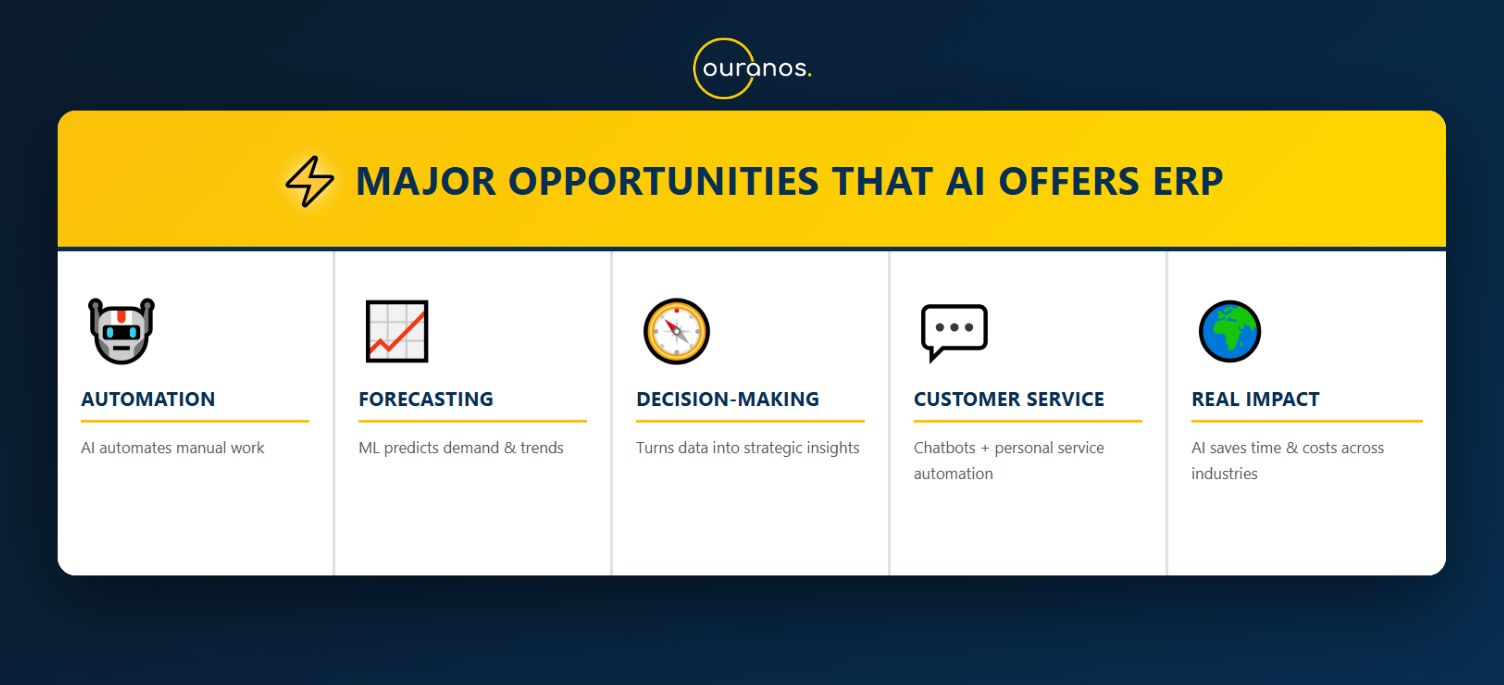
The opportunities associated with AI-based ERP systems are rather numerous and contribute to the improvement of business performance to a considerable extent.
1. Automation of Routine Tasks
Most of the ERP activities entail manual repetitions, including data entries, reconciliation, report generation, and approvals. AI automates all of these functions, minimizing human error and enabling employees to work on strategic objectives. The use of automated invoice matching, smart document processing, and intelligent workflow is becoming a standard feature of ERP tools that are used today.
2. Better Forecasting with Predictive Analytics
AI is very useful in enhancing forecasting. Machine learning is used in supply chain management to analyze the previous sales of the business, your sales trends, the suppliers' performance, and the trend of market trend. It forecasts the demand, optimizes levels of stock, and prevents overstocking or shortages. Predictive modeling is utilized by finance teams to make revenue predictions and cash flow plans.
3. Enhanced Decision-Making
AI-based ERP systems transform raw data into insights. The leaders receive real-time dashboards to indicate the risks, opportunities, and performance gaps. Managers are also able to make informed decisions supported by sound analytics as opposed to making decisions based on their gut feeling. The strength is essential in budgeting, planning, and the development of long-term strategies.
4. Better Customer Service
AI is used to improve customer-facing modules through analyzing preferences, behaviors, and previous interactions. Chatbots provide instant support, personal recommendations assistance boosts sales, and automated service processes cut down waiting time. The customers get a quicker response and solutions that are relevant.
5. AI in ERP in the Real World
The real-world AI-driven ERP advantages are already being realized by companies operating in different industries:
- A manufacturing company saved more time and used AI to forecast failures of machines and stop them before they happened.
- A retail chain enhanced accuracy in demand forecasting, which reduced the excess inventory cost by a considerable margin.
- The majority of invoice handling by an AI-based ERP module in a finance department saves the department hours of manual labor every week.
These illustrations indicate that AI makes everyday routine tasks efficient, accurate, and fast.
Difficulties of ERP AI Implementation
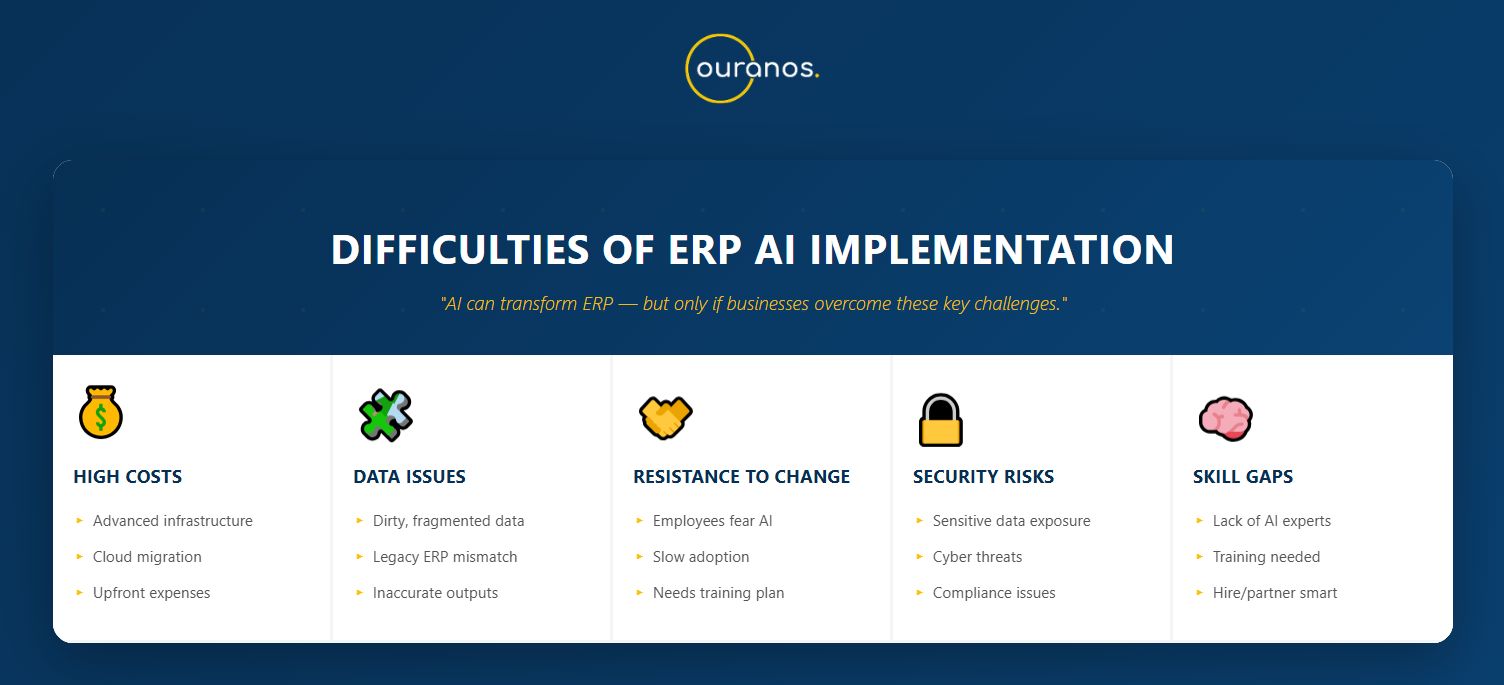
Despite the significant benefits of AI, incorporating it into ERP systems has its own difficulties that business needs to learn and manage.
1. High Implementation Costs
AI needs to have advanced infrastructure, upgraded systems, and quality hardware support. SMEs tend to hold back because of the upfront costs of migrating to the cloud, automation software, and AI-powered ERP applications. Although the long-term payback is good, initial expenses are also an issue.
2. Issues of Data Quality and Integration
AI relies solely on clean, structured, and centralized data. Most legacy ERP systems have fragmented or isolated information. Poor quality of data decreases the precision of AI predictions. It can also be a technical challenge to integrate several legacy systems with an ERP environment that is friendly to AI.
3. Resistance to Change
Automation can make employees feel threatened, and they can also be worried about transitioning to AI-powered tools. In the absence of appropriate awareness and training, the process of adoption is sluggish. Businesses need to allocate funds to change management tools that make employees learn that AI will assist them and not replace them.
4. Security and Privacy Issues
ERP systems, which are driven by AI, tend to deal with sensitive business information. A high priority is placed on ensuring that this information is not exposed to cyber attacks. Since AI models will be used on mass data, businesses should make sure to protect privacy, compliance, and ethical data use whenever working with data.
5. Skill Shortages and Requirement of Expertise
Not every organization possesses the technical skills that would help it create, support, and maintain AI-enabled ERP systems. There are high demands in the areas of data scientists, AI engineers, and ERP specialists. Firms might have to incur the costs of training current staff or hire skilled technological providers such as Ouranos Technologies to be successful in implementation.
Emerging AI Trends in ERP
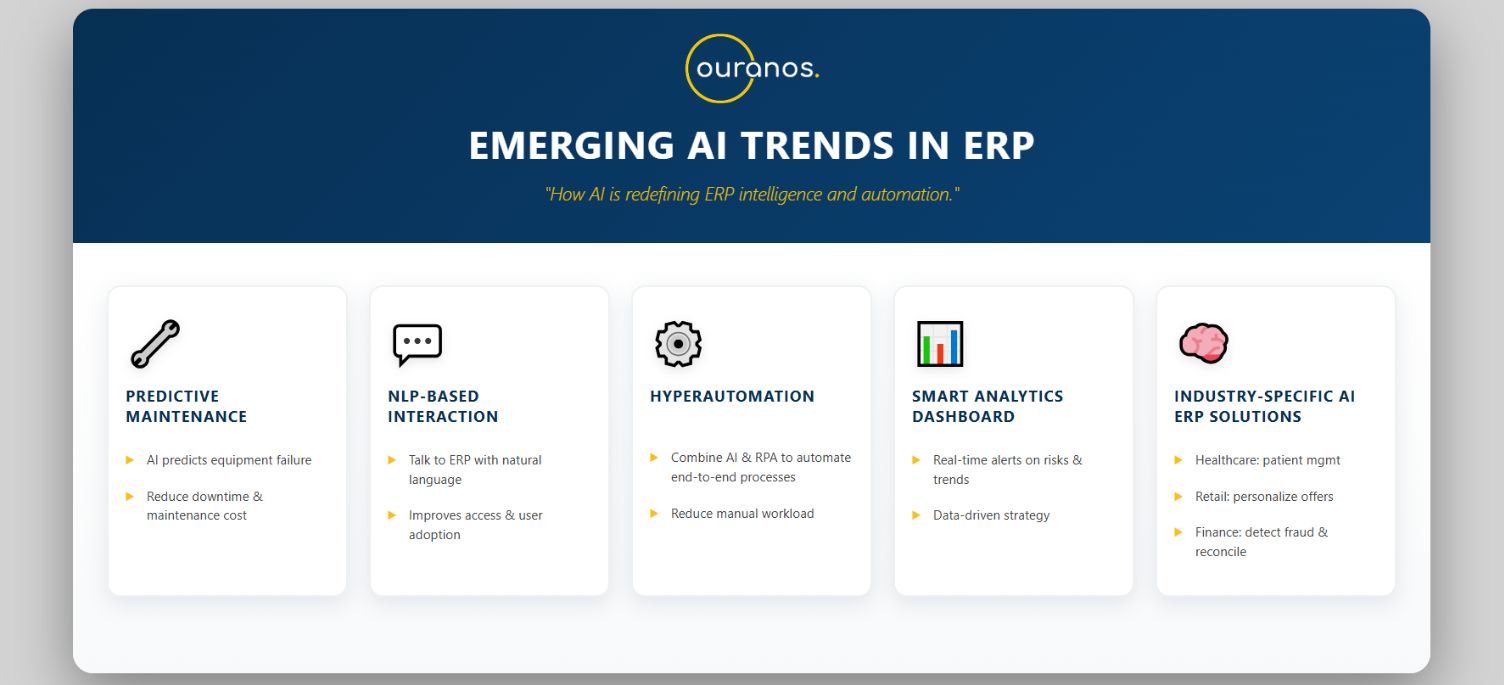
The trends of AI are changing fast, and the ERP systems are getting cleverer and more intuitive. These are some of the most significant changes defining the future.
1. Predictive maintenance using AI power
Machinery, vehicles, and equipment are a necessity for manufacturing and logistics companies. AI assists in the prediction of breakdowns prior to their occurrence and shortens downtime and maintenance expenses. ERP systems can analyze sensor data, maintenance history to give teams early warning.
2. NLP to enhance better interaction
NLP enables users to engage with ERP systems through easy conversational commands. Rather than scrolling through the menus, the users can pose questions such as Show me the sales report today or What is the level of product X? This trend enhances access and adoption by the users.
3. Hyperautomation
Hyperautomation is a mixture of AI and Robotic Process Automation (RPA) to automate end-to-end processes. Take the case of a complete procurement process that does not involve manual processes. Firms achieve increased precision, quick processing, and lower operational expenses.
4. Smart Dashboards of Analytics
The new ERP dashboards are based on AI to attract attention to the risk, opportunities, and abnormal patterns. Such dashboards assist the executives in being real-time informed. They do not have to wait and see what happens to them after a month to come up with strategic decisions.
5. Solutions based on AI ERP, industry-specific
Artificial intelligence is becoming more industry-specific. The AI is incorporated in a healthcare ERP to manage patients and check their compliance. AI is used in retail systems to promote individual customers. ERPs based on finance also have fraud detection and automated reconciliation.
Such a change in intelligence, which is industry-specific, is more efficient and relevant to the end outcomes of the business arena.
The way businesses can be ready for AI in ERP
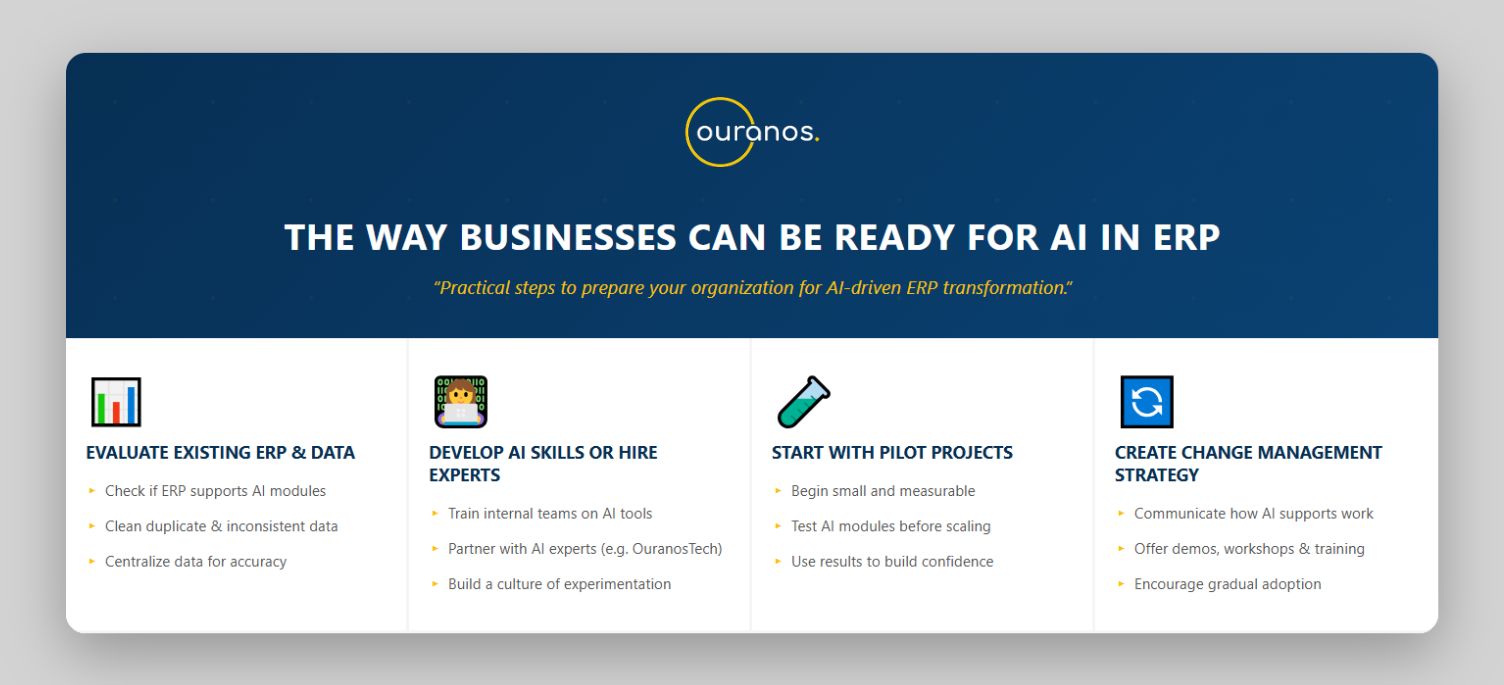
To implement AI-driven ERP successfully, companies that intend to adopt the solution can take practical steps to make its implementation effective and smooth.
1. Evaluate the existing ERP System and Data Quality
The initial step that businesses can take is to determine whether the current ERP system is capable of accommodating the AI capabilities. Data cleanup is essential. Elimination of duplicates, corrections, and centralizing information enhances the accuracy of AI.
2. Develop AI Skills or Hire Experts
Organizations can educate their employees about AI tools or cooperate with AI-based ERP vendors. This can be achieved through working in collaboration with experienced technology partners such as Ouranos Technologies to close the skills gap and ensure a smoother transition.
3. Start With Pilot Projects
The small AI applications can be used as a starting point to evaluate the performance, accuracy, and usability of companies. When teams become accustomed and the profits are realized, the organization can be able to expand AI into departments.
4. Create a Change Management Strategy
User adoption is determined by a powerful communication and training plan. Employees have to know how AI can assist them in their everyday jobs. Confidence is developed with workshops, internal demos, and guided onboarding sessions.
Conclusion
AI is making ERP systems more than data management, simple tools, and turning them into business engines. The benefits of adopting AI-driven ERP are automation, enhanced forecasting, improved decision-making, and improved customer experiences. The trip has its challenges in cost, quality of data, and skill deficit, but the advantages greatly exceed the challenges.
The future of ERP lies in smart automation, intelligent forecasts, and custom user interfaces. Businesses that start to develop custom ERP with AI features today will be the ones leading tomorrow.
With the right strategy and technology partner, ERP with AI can become a powerful competitive advantage. That’s why Ouranos Technologies is the best choice for you.
Contact us now to start building your next-gen ERP system.

Latest Articles
Browse All Articles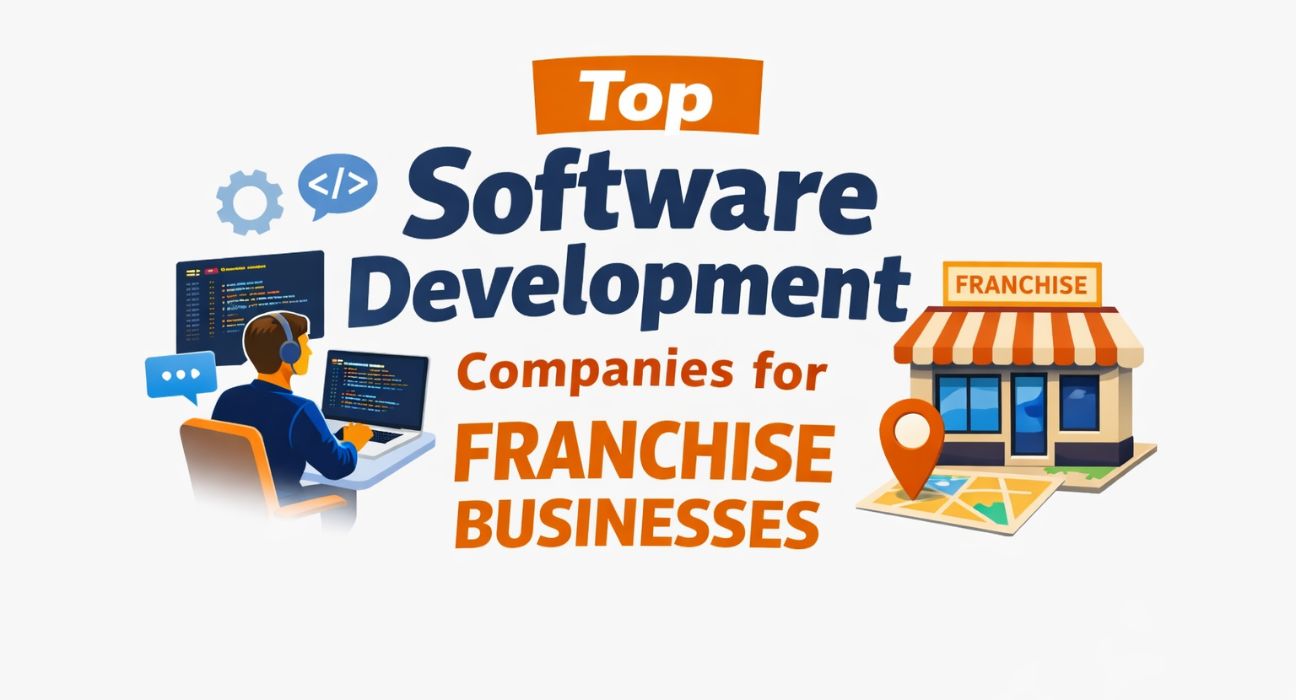
- Custom Software
- Feb 16, 2026
Top Software Development Companies for Franchise Businesses (2026)
Looking for the best software development companies for franchises in 2026? Explore our ranked list of top-tier developers building the future of franchise tech.
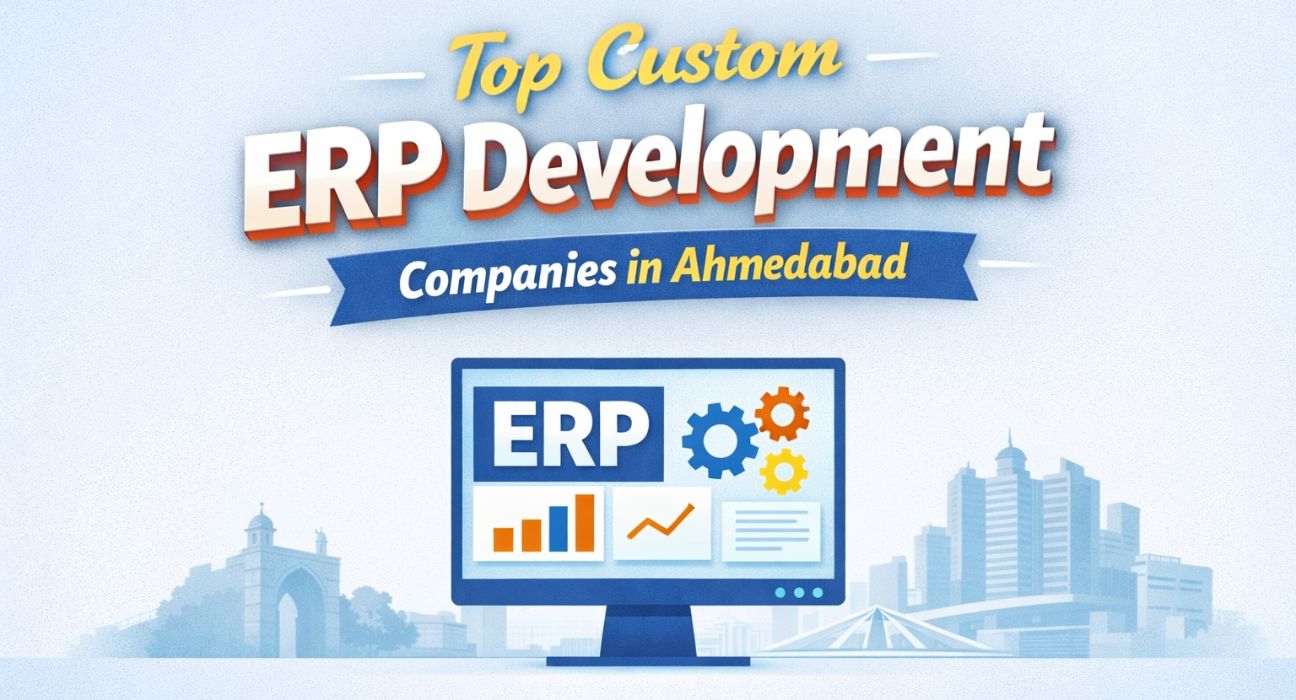
- Custom Software
- Feb 15, 2026
Top Custom ERP development Companies in Ahmedabad
Explore the top custom ERP development companies in Ahmedabad, offering tailored ERP solutions to streamline business processes, and boost efficiency.



